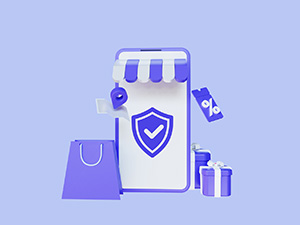
Are you planning to buy gifts for the special women in your life this Mother’s Day? Shopping online is convenient, but it's important to do it safely. Cybercriminals often use various scams to target innocent shoppers during the holidays. In this article, we’ll share the safest ways to make online purchases, common scams to watch out for, and top online shopping best practices to keep you protected.
How to Safely Make Online Purchases
Using your debit card for online shopping might seem convenient, but it's not the safest option. Debit cards are directly linked to your bank account, making it difficult to retrieve your money in case of fraudulent transactions. Instead, opt for a credit card or a third-party payment system for added security.
Credit card companies offer extensive fraud monitoring systems that can quickly detect any suspicious activity. With statistical analysis and machine learning, they can identify discrepancies in your transactions and allow you to dispute unauthorized purchases. Some credit card companies, like Capital One, even offer virtual credit cards, providing you with a random 16-digit number, a three-digit CVV, and an expiration date. This adds an extra layer of security as retailers cannot access your actual card details. (And, as an added bonus, these virtual cards can be “turned off” at any time, eliminating the hassle of canceling unneeded subscriptions without going through the merchant.)
Third-party payment tools like PayPal are also a great option as they don’t exchange personal information with the seller, keeping your financial data secure.
Online Shopping Best Practices
While using a credit card, a virtual card, or a third-party payment tool is a good start, there are other proactive steps you can take to stay safe while shopping online:
- Shop from legitimate websites: Be cautious of fake websites that mimic big-name retailers. Always visit the official website to make your purchases.
- Avoid too-good-to-be-true offers: If an offer sounds too good to be true, it probably is. Verify the deal on the retailer's official website before making a purchase.
- Do not click on promo links in emails: Cybercriminals often send spoof emails with malicious links. Avoid clicking on these links to protect your network from malware.
- Use a VPN: A Virtual Private Network (VPN) hides your location and web browsing information, making it harder for snoopers to access your data.
- Don’t save your payment information: While password tools may offer convenience by saving your payment information, they also make you vulnerable to data breaches. Avoid saving your payment details online.
- Use unique logins for loyalty accounts: Avoid using the same email and password combination for all your accounts. This prevents hackers from accessing multiple accounts if one is compromised.
- Set up alerts: Enable notifications in your banking system to receive alerts for any suspicious activity or transactions.
Cybercriminals will use any method they can to steal your information and money. Protect yourself by taking proactive measures to safeguard your financial information, not only personally but also for your business. If hackers are willing to put this much effort into stealing money for low-dollar purchases, imagine what they would do to access your company accounts. Your customer data, employee information, trade secrets and more can be worth millions to them.
If you're concerned about the security of your company's network, we offer a FREE Cyber Security Assessment. Our team will identify any vulnerabilities in your network and help you protect your valuable data. Click here to book your FREE Assessment now or call our office at 281-646-1200.



